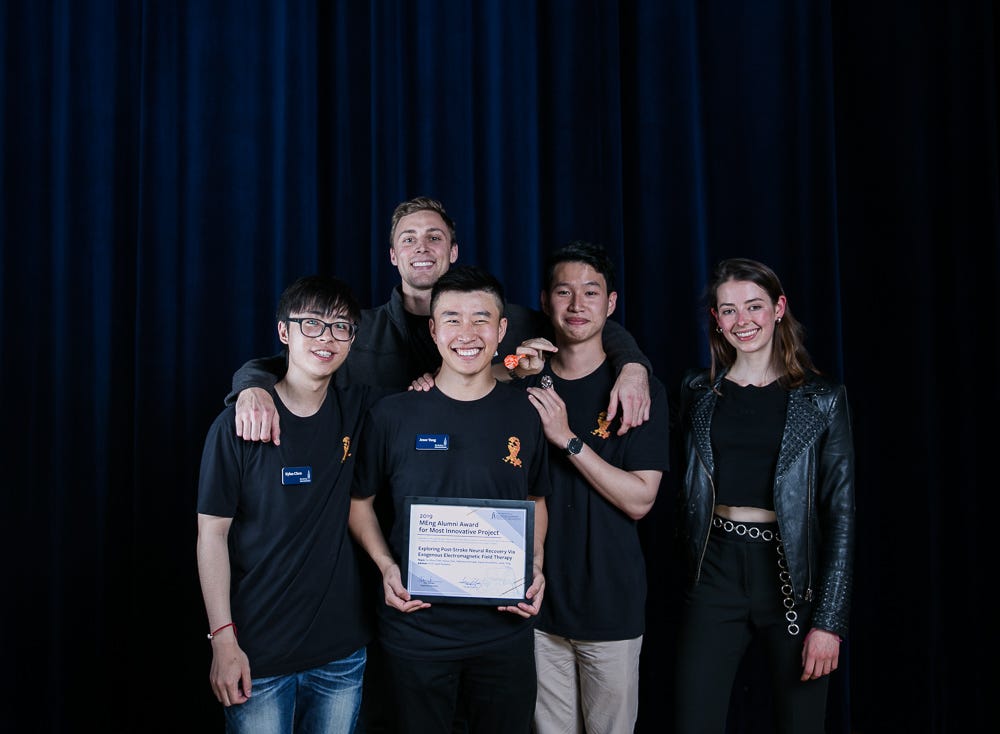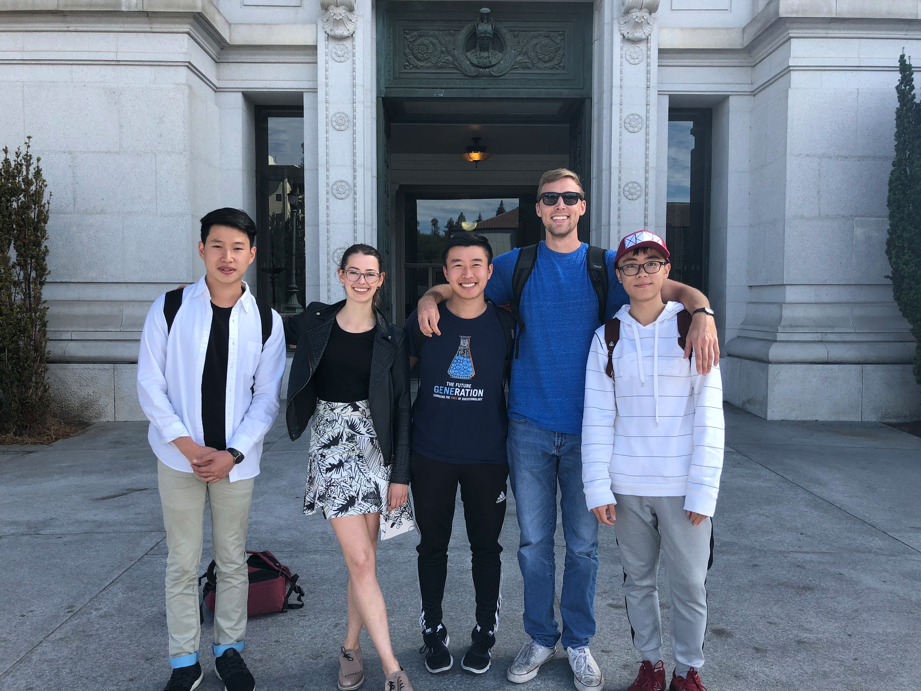Edited by Ashley Villanueva

Exploring Post-Stroke Neural Recovery Via Exogenous Electromagnetic Field Therapy
Ischemic stroke, characterized by the restriction of blood flow to the brain due to mechanical blockage via blood clot, leads to severe functional loss and mortality (in both developed and emerging nations). Current therapies for ischemic stroke are inadequate due to narrow time window for effective therapy that leads to loss of neural function even after blood flow is reestablished. Our team aims to develop an adjunctive therapy alongside conventional thrombectomy (clot removal ) using low-frequency electromagnetic field (LFEMF) stimulation to support neural rehabilitation, thereby improving patient’s functional recovery. It is our hope to establish a foundation for future exploration of LFEMF as a new era of stroke treatment. We had a chance to speak with the Capstone team (Yu-Shuo Chen, Kylua Chen, Matthew Kennedy, Paula Schultheiss, and Jesse Yang) about their experience.
How did you define the scope of the Capstone project?
We kicked off our Capstone project by first combing through the literature and assessing the current landscape of innovation surrounding treatment of ischemic stroke and its respective pathologies. After developing a general idea, we then realistically assessed what could be achieved within the allotted time and if this outcome provided a novel contribution both in academic and industry environments. The key to defining our scope was accurately depicting how our final deliverable would be received by all involved stakeholders and if the components, both labor and materials, could be feasibly assembled given the resources available to us.What was your most significant teaming challenge and how did you tackle it?
Our Capstone was composed of five members from different backgrounds, talents, and cultures. Each one of us has different strengths in a different field and our own unique experiences. Initially, it was a time-consuming process to figure out how to incorporate everyone’s talents into an effective role on the project team. Over the course of the semester and after numerous meetings, we managed to counter this issue and make it our biggest strength!What was your most significant project management challenge & how did you tackle it?
Our project was very unique in the sense that it was heavily involved in both biomedical research at UC Berkeley and industry applications at Imperative Care, Inc. This created a particularly challenging environment as our team had to constantly monitor our design process and project timeline to ensure that our two primary stakeholders were satisfied. We were able to effectively accomplish this by identifying exactly what each stakeholder required and then proceeded to eliminate any process resulting in non conformance to the specified stakeholder requirements.What was your most significant technical challenge and how did you tackle it?
We worked with a 2D cell culture system of primary neural cells and human embryonic stem cells. Both cell lines are difficult to maintain and even more complicated to differentiate into mature neurons. We needed to develop a streamlined lab routine to keep the cells alive and healthy. Furthermore, we developed a robust differentiation protocol for human embryonic stem cells to obtain functioning neurons after testing out various conditions. The field of stem cell research is still in its infancy and there were only a few standardized methods we could rely on for our experimental approach.Have you had a capstone project in your undergrad and, if so, how has this Capstone experience been different?
Many of us had some experience working on a large project during undergrad, whether it be a Capstone or a senior design project. For some of us, it was heavily individual-based and barely involved teamwork. For others, we were required to work in teams but never had the experience or guidance on how to collaborate effectively. This program stands out because the Fung Institute provided outstanding mentors and advisors that really taught us how to be a team.Ultimately, our Capstone was a fantastic and unique learning experience unlike any other.
You probably had a number of course-based projects during your MEng year. How is the Capstone different?
Many of our courses throughout the year did involve large-scale projects that required working with teams. For example, a number of us had to come up with our own biotech startup and present it as a pitch. However, the Capstone project is different because it challenges you to tackle so many things all on your own. We learned that our project isn’t just our final product and our lab results, but everything that goes into it. We communicated with our stakeholders, learned to take feedback from our industry partners, figured out how to divide tasks and collaborate effectively, and developed our leadership and management skills. These are things that aren’t taught solely in courses, and we are grateful to have had the experience through our Capstone.Is there anything else you’d like to add?
Thank you to everyone in the entire Berkeley MEng program for an amazing year! Working on this Capstone project has been an amazing learning experience. We are all extremely grateful for the support from our advisors, our peers, and everyone in the Fung Institute that have supported us throughout this process. Connect with the team: Yu-Shuo Chen (BIOE), Kylua Chen (BIOE), Matthew Kennedy (BIOE), Paula Schultheiss (BIOE), and Jesse Yang (BIOE)Q&A with Brain Cell Rejuvenation, winners of the 2019 Most Innovative Project was originally published in Berkeley Master of Engineering on Medium, where people are continuing the conversation by highlighting and responding to this story.




